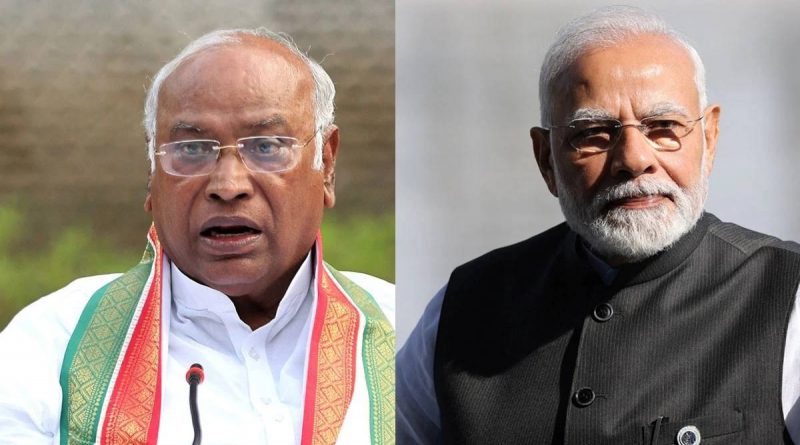Did Modi Dodge Kashmir Trip After Intel Warning? Truth Behind Kharge’s Claim
The logistics of Modi’s schedule further weaken Kharge’s claim. Organizing a high-profile international trip like the Saudi visit requires weeks of preparation, leaving little room for a last-minute Kashmir visit.
In a startling accusation, Mallikarjun Kharge, president of India’s opposition Congress Party, recently claimed that Prime Minister Narendra Modi canceled a planned visit to Kashmir after receiving an intelligence warning three days before the devastating Pahalgam attack on April 22, 2025.
The attack, which killed 26 people, mostly tourists, in the scenic Kashmir valley, sent shockwaves across India and beyond, intensifying regional tensions. Kharge’s allegation, widely shared on platforms like IndiaToday and Beatroot, has ignited controversy, with critics calling it a politically motivated fabrication.
For an international audience seeking clarity, a closer look at the timeline, Modi’s schedule, and the complexities of India’s security landscape reveals a claim that lacks evidence and struggles to hold up.
The Pahalgam Attack: A Brutal Blow
The Pahalgam attack ranks among the deadliest in Jammu and Kashmir in nearly two decades. On April 22, 2025, at 2:30 PM local time, gunmen targeted Hindu tourists in Baisaran meadow, a picturesque spot in the Kashmir valley. The Resistance Front (TRF), a militant group linked to Pakistan-based Lashkar-e-Taiba, initially claimed responsibility before retracting its statement due to public backlash.
India accused Pakistan of orchestrating the attack, further straining already tense relations between the nuclear-armed neighbors. The tragedy not only highlighted the fragility of security in Kashmir—a disputed region claimed by both India and Pakistan—but also raised questions about intelligence failures.
Kharge’s claim centers on a specific assertion: Modi received an intelligence report on April 19, 2025, warning of the attack and promptly canceled a planned Kashmir visit to avoid danger. The accusation paints Modi as prioritizing personal safety over leadership in a crisis. But when examined against verifiable facts, the narrative begins to crumble.
Modi’s Schedule: No Trace of a Kashmir Trip
First, let’s consider Modi’s itinerary. On April 19, 2025—the day Kharge alleges Modi was warned—India’s Ministry of External Affairs announced Modi’s upcoming visit to Saudi Arabia, scheduled for April 22–23. Modi arrived in Jeddah on April 22, where he was set to co-chair the second India-Saudi Arabia Strategic Partnership Council meeting, a key diplomatic engagement to strengthen bilateral ties.
When news of the Pahalgam attack broke, Modi cut his visit short, skipping a formal dinner, and returned to New Delhi on April 23 to convene an emergency meeting with top officials, including Foreign Minister S. Jaishankar and National Security Advisor Ajit Doval. This timeline, corroborated by global media outlets like The Hindu, shows Modi’s focus was on international diplomacy, not a domestic trip to Kashmir.
No evidence suggests a Kashmir visit was ever planned. Modi’s trips to volatile regions like Kashmir are often unannounced for security reasons, but no government statements, media reports, or credible social media sources indicate a scheduled visit in April 2025.
Modi’s last major Kashmir trip was in January 2025, to the resort town of Sonamarg where he inaugurated the 6.5-kilometer tunnel. Kharge’s claim of a cancellation implies a visit was on the table, but without documentation, it appears speculative. Open-source intelligence platforms, found no mention of a planned Kashmir trip in the days before the attack, undermining Kharge’s narrative.
The Intelligence Puzzle
Kharge’s allegation also hinges on the existence of a specific intelligence report warning of the Pahalgam attack. India’s intelligence agencies, such as the Research and Analysis Wing (RAW) and the Intelligence Bureau (IB), routinely monitor threats in Kashmir, where militancy remains a persistent challenge.
These reports are highly classified, and specific warnings are rarely made public. This suggests that while general intelligence on militant activity likely existed, a precise warning about the April 22 attack may not have been issued—or was not actionable.
Kharge provides no evidence to support his claim of a specific report. As an opposition leader, his access to classified intelligence would likely come from unofficial channels or leaking buckets, casting doubt on the reliability of his statement. Without corroboration, the claim risks fueling misinformation in a region already fraught with competing narratives.
Modi’s Response: Crisis Management, Not Evasion
Modi’s actions after the attack contrast sharply with Kharge’s portrayal. Upon returning to Delhi, Modi chaired an emergency meeting, condemned the attack as “cowardly,” and vowed to bring the perpetrators to justice, as reported by The Hindu.
His government launched a sweeping response, detaining over 1,500 suspects, demolishing homes of alleged militants, and suspending the Indus Waters Treaty with Pakistan—a 1960 agreement governing shared river resources. Modi even rerouted his return flight to avoid Pakistani airspace, signaling a hardline stance. These measures reflect a leader grappling with a national crisis, not one dodging responsibility by canceling a visit.
The Political Context
To understand Kharge’s claim, it’s crucial to consider India’s domestic politics. The Congress Party has long criticized Modi’s Bharatiya Janata Party (BJP) government over its Kashmir policy, particularly the 2019 decision to revoke Article 370, which stripped Jammu and Kashmir of its semi-autonomous status. The BJP touted this move as a path to stability, but the Pahalgam attack challenged that narrative, giving the opposition an opening to question Modi’s leadership.
Kharge’s allegation aligns with this strategy, aiming to portray Modi as detached or negligent. However, without evidence, the claim has drawn backlash, with social media posts on X labeling it “venomous” and accusing Kharge of inadvertently bolstering Pakistan’s narrative—a risky move for Congress’s credibility.
Logistical Realities
The logistics of Modi’s schedule further weaken Kharge’s claim. Organizing a high-profile international trip like the Saudi visit requires weeks of preparation, leaving little room for a last-minute Kashmir visit.
Why It Matters
The Pahalgam attack underscores the enduring volatility of Jammu and Kashmir, a region at the heart of India-Pakistan tensions for decades. Beyond the human toll, the tragedy highlights the challenges of securing a conflict-prone area while navigating geopolitical rivalries. Kharge’s claim, while attention-grabbing, lacks the evidence needed to hold up under scrutiny.
Modi’s documented schedule, the absence of a confirmed Kashmir visit, and the speculative nature of the intelligence report all point to a narrative driven more by political point-scoring than by facts.
For the international community, this episode serves as a reminder of the complexities of India’s internal and external challenges. The focus should remain on addressing the root causes of violence in Kashmir—enhancing security, fostering dialogue, and ensuring justice for victims.
Unsubstantiated claims like Kharge’s, while sparking debate, risk diverting attention from these critical priorities. In a region where truth is often obscured by competing narratives, facts must guide the path forward.



